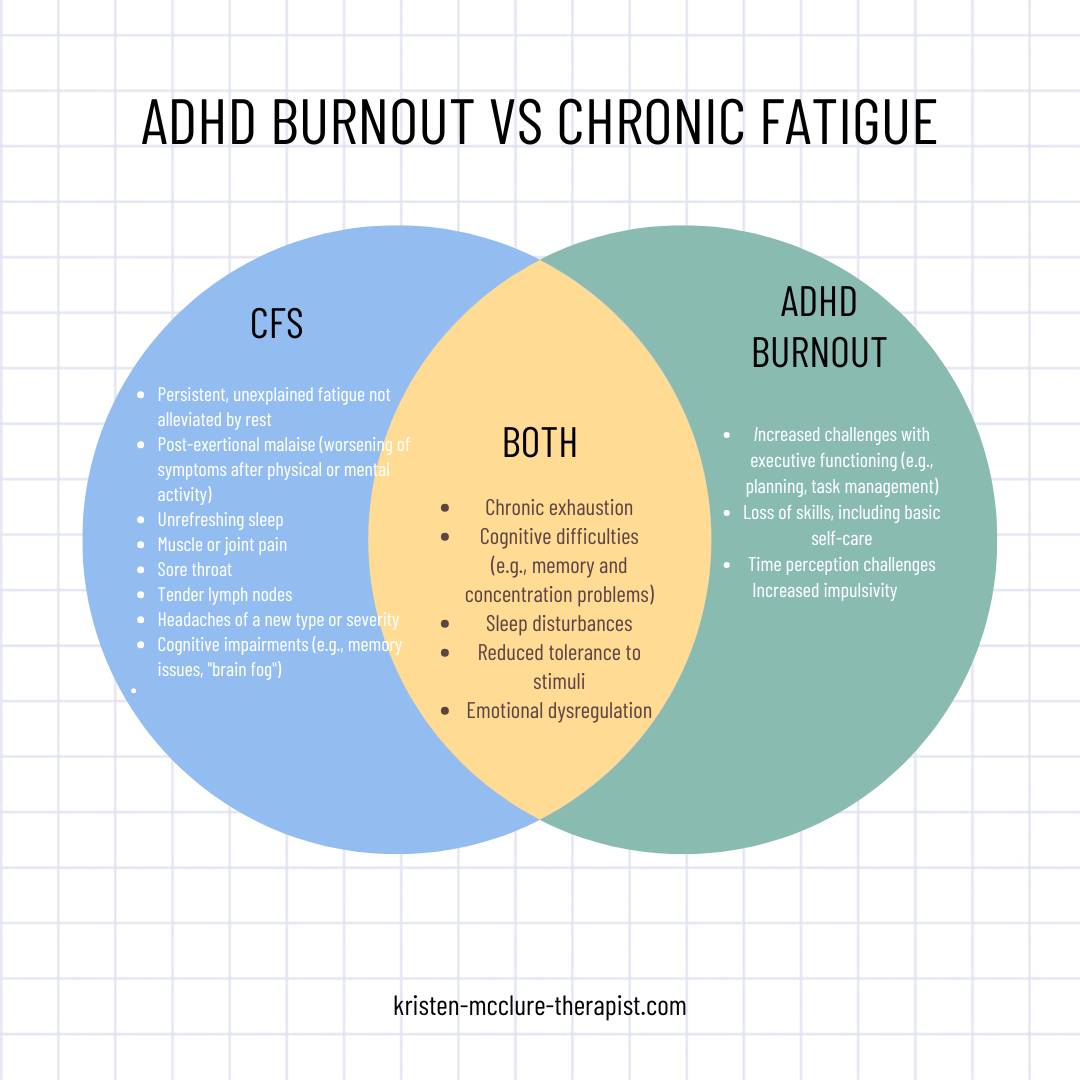Chronic Fatigue Syndrome and ADHD Burnout: Untangling the Connection
Burnout is a term we hear often, describing that bone-deep exhaustion when stress pushes us past our limits. For people with ADHD, burnout takes on a whole new meaning. The mental and emotional load of managing ADHD can lead to a specific kind of burnout, marked by fatigue, executive dysfunction, and emotional dysregulation. Chronic Fatigue Syndrome (CFS), meanwhile, is a medical condition characterized by debilitating exhaustion that doesn’t go away, no matter how much rest you get.
These two conditions—Chronic Fatigue Syndrome and ADHD Burnout—share several symptoms, from brain fog to chronic fatigue, making it easy to confuse one with the other. But are they connected? Let’s explore the overlap and differences, and what this means for those navigating the exhausting intersection of these two experiences.
What Is ADHD Burnout?
ADHD burnout occurs when the constant effort of managing ADHD symptoms—often in environments not designed for neurodivergence—leaves you physically, mentally, and emotionally drained. It’s not just about being tired; ADHD burnout can feel like a total system shutdown.
Key Symptoms of ADHD Burnout:
- Persistent fatigue tied to emotional and cognitive stress.
- Difficulty with planning, organizing, and completing tasks (executive dysfunction).
- Emotional dysregulation, such as irritability or hopelessness.
- Cognitive issues like memory lapses or inability to focus.
- Increased impulsivity or loss of basic routines (e.g., skipping meals or hygiene tasks).
ADHD burnout often follows periods of overexertion, such as hyperfocusing on a project or trying to meet neurotypical standards by masking ADHD traits. While breaks and rest may help, the road to recovery isn’t always straightforward.
What Is Chronic Fatigue Syndrome (CFS)?
Chronic Fatigue Syndrome, also known as Myalgic Encephalomyelitis (ME/CFS), is a complex medical condition marked by extreme exhaustion that lasts for six months or longer. Unlike ADHD burnout, CFS isn’t tied to specific stressors or cognitive overload and doesn’t improve with rest.
Key Symptoms of CFS:
- Persistent, unrelenting fatigue.
- Post-exertional malaise (PEM): Worsening of symptoms after physical or mental activity.
- Sleep that doesn’t feel restorative.
- Cognitive “brain fog” that impairs memory and focus.
- Physical symptoms such as muscle or joint pain, sore throat, and headaches.
- Orthostatic intolerance, or dizziness when standing.
CFS can be triggered by infections, immune system changes, or unknown factors, and it often requires a medical diagnosis.
Where ADHD Burnout and CFS Overlap
For many individuals, the symptoms of ADHD burnout and CFS feel strikingly similar. Both involve exhaustion, brain fog, and reduced productivity, making it easy to misinterpret one for the other—or to experience both simultaneously.
Shared Symptoms:
- Chronic exhaustion that disrupts daily life.
- Cognitive impairments, such as difficulty concentrating or processing information.
- Sleep disturbances, including trouble falling or staying asleep.
- Emotional dysregulation, such as irritability or mood swings.
- Sensitivity to external stimuli, like light, noise, or stress.
These similarities can lead to delayed diagnoses or inadequate care if one condition is mistaken for the other.
How Are ADHD Burnout and CFS Different?
Despite the overlap, ADHD burnout and CFS are distinct conditions with different causes and treatment approaches.
| Aspect | ADHD Burnout | Chronic Fatigue Syndrome |
|---|---|---|
| Primary Cause | Prolonged emotional and cognitive stress from ADHD | Medical condition, often tied to immune dysfunction |
| Recovery | Improves with rest or stress reduction | Persistent fatigue, regardless of rest |
| Physical Symptoms | Minimal or stress-induced | Muscle pain, sore throat, tender lymph nodes |
| Post-Activity Impact | May feel tired but recover | Symptoms worsen after physical or mental exertion |
| Triggers | Linked to masking, hyperfocus, or environmental demands | Often unrelated to external stressors |
Understanding these differences is crucial for accurate diagnosis and effective management.
Navigating Life with ADHD Burnout and Chronic Fatigue
Living with ADHD burnout and CFS can feel overwhelming, but recognizing their connection and distinctions is the first step toward relief. Here are strategies to help:
1. Energy Conservation
- Use the Spoon Theory to budget your energy for essential activities.
- Learn about your sensory system as a neurodivergent person
- Practice boundaries
- Learn about energy cycles
- Learn about energy management
2. Optimize Rest
- Incorporate rituals
- Establish a consistent sleep routine to improve sleep quality.
- Incorporate relaxation techniques like mindfulness or deep breathing.
3. Manage ADHD Burnout
- Learn about masking
- Learn about stimming
- Learn about stress to reduce cognitive load.
- Understand how you are different and how your hormones impact you
4. Seek Medical Support
- Work with a healthcare provider to address potential underlying causes of fatigue.
- Advocate for a multidisciplinary approach, combining ADHD support with treatment for physical symptoms.
5. Practice Self-Compassion
- Allow yourself grace during periods of low energy.
- Celebrate small wins, even if they feel minor.
- Research Insights:
- Overlap in Symptoms: Both conditions exhibit significant symptom overlap, particularly in areas like cognitive dysfunction and fatigue. This similarity can lead to diagnostic challenges and potential misdiagnosis.
- Inflammatory Links: A longitudinal study found that children with neurodivergent traits, such as ADHD, had higher levels of the inflammatory marker interleukin-6 (IL-6) at age 9. Elevated IL-6 was associated with an increased risk of chronic disabling fatigue by age 18, suggesting that inflammation may mediate the relationship between neurodivergent traits and chronic fatigue.
- Transdiagnostic Features: Research indicates that adults with ADHD experience higher levels of fatigue compared to healthy controls. Both ADHD and CFS groups share clinical characteristics, including low mood, anxiety, and reduced self-efficacy, impacting overall functioning.
- Neurochemical Mechanisms: Central fatigue, characterized by inattention, is closely related to ADHD symptoms. The tryptophan-kynurenic acid pathway has been implicated in central fatigue, suggesting a potential neurochemical link between central fatigue and ADHD.
Conclusion: While Chronic Fatigue Syndrome and ADHD burnout are distinct conditions, they share overlapping symptoms and may have interconnected underlying mechanisms, such as inflammation and neurochemical pathways. Recognizing these connections is crucial for accurate diagnosis and effective treatment strategies.
Conclusion: Finding Balance Between Exhaustion and Recovery
ADHD burnout and Chronic Fatigue Syndrome can feel like insurmountable obstacles, but they don’t have to define your life. By understanding the nuances of each condition and seeking targeted strategies, you can start to reclaim your energy and rebuild your resilience.
If you’re struggling with unshakable exhaustion, know you’re not alone. Whether it’s ADHD burnout, CFS, or a mix of both, there’s hope—and help—on the horizon.
References:
- Adriaenssens, J., et al. (2022). Stress and work-related mental illness among working adults with ADHD: A qualitative study. BMC Psychiatry, 22(1), 1-15. https://doi.org/10.1186/s12888-022-04409-w
- Quadt, L., et al. "Childhood neurodivergent traits, inflammation and chronic disabling fatigue in adolescence: a longitudinal case–control study." BMJ Open, vol. 14, no. 7, 2024, e084203.
- BMJ Open
- Rogers, D. C., et al. "Fatigue in an adult ADHD population: a trans-diagnostic approach." British Journal of Clinical Psychology, vol. 56, 2017, pp. 33–52.
- KCL Pure
- Skee Publishing. (n.d.). Undiagnosed ADHD and burnout syndrome – Is untreated ADHD a risk factor? International Journal of Neuro and Behavioral Sciences. Retrieved from https://skeenapublishers.com/journal/ijnbs/IJNBS-05-00050.pdf





